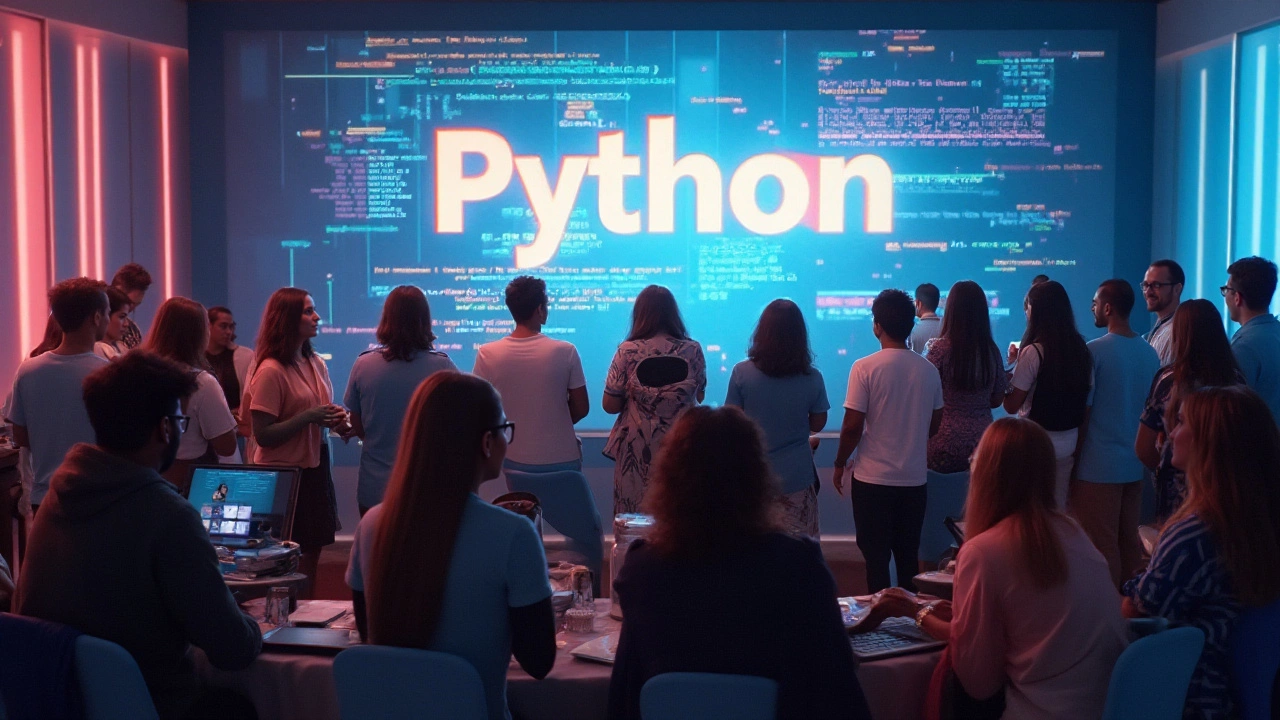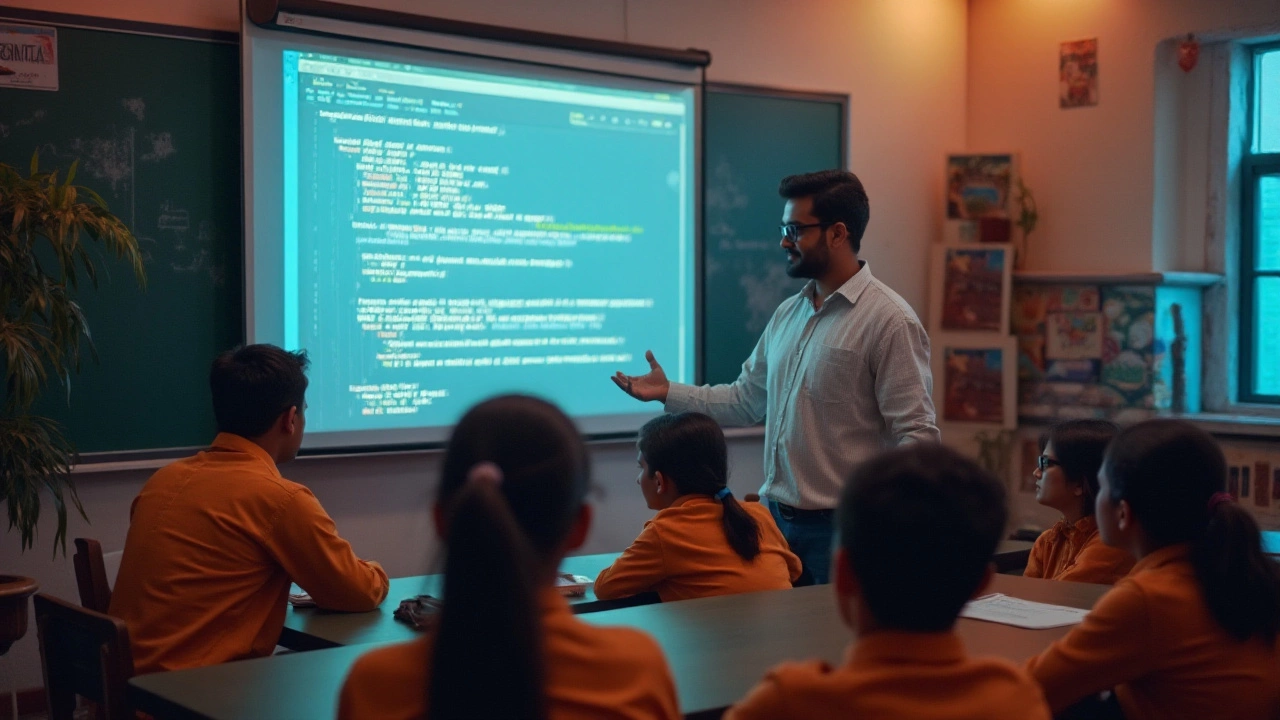In the dynamic world of tech, choosing the right programming language can significantly impact your career prospects. These days, Python is often hailed as a 'must-have' skill. But is mastering Python enough to land that coveted job? Let's dive into the reasons why Python holds such a prestigious spot among programming languages, and how it fits within the larger tech landscape.
Python is celebrated for its clean syntax, ease of learning, and wide range of applications—from web development to data analysis, and artificial intelligence. But as technology evolves, so do employer expectations. While Python brings a host of opportunities, stacking it with complementary skills could be the key to standing out.
- Python's Popularity and Versatility
- Industries and Job Roles Favoring Python
- Supplementary Skills to Learn Alongside Python
- Practical Tips for Aspiring Python Developers
Python's Popularity and Versatility
Python is perhaps one of the most beloved programming languages in the tech world, thanks in no small part to its incredible ease of use and wide-ranging applicability. This language, initially released in 1991 by Guido van Rossum, has skyrocketed in popularity over the past decade. Its simple syntax, which reads almost like English, makes it ideal for beginners while providing enough depth to challenge veteran developers. Python's design philosophy emphasizes readability and simplicity, making it a favorite as first-level exposure to coding in many educational programs around the globe.
One of Python's standout features is its extensive standard library, which supports myriad functionalities out of the box. Whether you are dabbling in web development, curious about data analysis, or venturing into artificial intelligence, Python has a package or library ready to help. For web apps, frameworks like Django and Flask simplify the process, while NumPy and Pandas cater to the data-hungry. In the sphere of AI and machine learning, TensorFlow and PyTorch have become household names among data scientists. This versatility across disciplines means that a developer with a solid grasp of Python can pivot across roles and industries, making it a powerful asset for career flexibility.
Python's adoption in industries is staggering. From tech giants like Google and Netflix, which rely on Python for scalability and innovation, to startups looking for rapid development and deployment success, the language is everywhere. The fact that Python runs on almost any platform and integrates seamlessly with other languages only boosts its ubiquity. According to a survey by Stack Overflow in 2022, Python ranks as one of the most wanted and most loved programming languages, cementing its status in the developer community.
Adding to its appeal, the Python community is one of the most robust and active programmer communities worldwide. Frequent conferences, online forums, and open-source collaboration sites like GitHub create an environment where sharing knowledge and resources is commonplace. This means that when you're stuck with a particularly gnarly bug, help is often just a post away. As Tim Peters, a prominent figure in the Python community, once remarked, "Python is about having the right tools to get the job done". This community-driven innovation continually refines and upgrades Python, ensuring it remains a cutting-edge tool.
While versatility and ease of use make Python attractive, its future-readiness is equally critical. As the landscape of technology changes, so does Python, adapting to trends like big data, IoT, and cloud computing. Its adaptability ensures that developers will continue using it as technologies evolve, which is why investing time in mastering Python pays dividends across diverse technological spaces. According to TIOBE's Index, Python topped the charts in 2023 as the most popular programming language. This achievement spotlights its ongoing relevance and validates its staying power in the ever-changing tech industry.
For those looking to launch or advance a career in programming, Python offers a wealth of opportunities. But it's not just the technical skills that make it appealing; Python's philosophy can inspire a more efficient and prettier approach to coding. The language teaches you to think clearly and organize your thoughts in a coherent sequence, which can be transformative, not just in coding, but in solving problems in general. Trust in Python's versatility and embrace the exciting possibilities it offers you in the realm of technology.

Industries and Job Roles Favoring Python
Python has carved a unique niche across a multitude of industries, standing tall as a versatile and efficient programming language. Whether you're looking to break into tech fresh from coding classes or seeking to expand your current skill set, it’s undeniably beneficial to understand the sectors where Python thrives. Its simplicity, coupled with a powerful toolkit, opens up an array of job roles and opportunities. One of the main industries where Python dominates is data science. Companies are increasingly relying on data to drive decisions, and Python's rich libraries like Pandas and NumPy make it the go-to language for data analysis and manipulation. What's more, aspiring data scientists will find that Python's compatibility with other languages and systems is ideal for building complex algorithms and models.
In the ever-evolving field of artificial intelligence and machine learning, Python remains a favorite. Developers and researchers prefer it due to its extensive libraries such as TensorFlow and PyTorch, which streamline the creation and training of models. These tools are crucial for professionals creating intelligent systems capable of self-learning. The demand for Python developers in AI roles continues to grow, reflected by a significant increase in job listings. Another vital area where Python shines is web development. With frameworks like Django and Flask, Python makes building robust and scalable web applications accessible. This is especially attractive for startups and businesses looking to balance cost-efficiency with quality. Python's flexibility enables developers to dynamically build applications that can scale as their business grows.
Moreover, the world of scientific computing and academic research benefits greatly from Python. It’s widely used for simulations, statistical calculations, and visualizing complex data sets. Scientists often prefer it over other languages because it offers a balance between productivity and control. Additionally, Python's easy readability aids collaboration across interdisciplinary teams who might not have equal programming knowledge. According to a study by JetBrains, 87% of Python users utilize the language for data analysis and processing.
Pew Research notes, "In a landscape where data drives decisions, Python's capabilities in data science provide a distinct advantage for organizations."As Python continues to grow, so do the job roles surrounding it. Whether you’re an analyst working with data, an engineer in AI, or a developer crafting websites, Python provides a unique edge in the tech world. Understanding the language's role across different sectors is an essential step in harnessing its full potential for your career.

Supplementary Skills to Learn Alongside Python
While Python sits proudly at the forefront of programming languages, and rightly so due to its simplicity and rapid development capabilities, knowing it alone might not guarantee a tech job in a highly competitive market. To amplify your job prospects, acquiring additional skills can be instrumental. One crucial area to consider is understanding databases. Most tech applications require some interaction with databases, making SQL a valuable asset to your tech toolkit. Becoming proficient in SQL allows you to effectively handle databases, which is a necessary skill in various industries utilizing Python.
Apart from databases, learning about version control systems like Git is imperative. Git isn't just a tool; it's become an essential cultural artifact in the world of software development, offering collaboration and code integrity. When you're diving into code collaboration, Git ensures efficiency and systematic tracking of changes. It's a common expectation from employers that their tech team is adept at using Git for maintaining codebases.
Git is a crucial skill for developers today, enabling collaborative coding and effective version management," notes Martin Fowler, a software development expert.
Also, while Python offers an extensive array of libraries, knowing how it interacts and functions within web frameworks such as Flask or Django can significantly broaden its applicability. Web development is still at the heart of many tech startups and large corporations alike. By mastering one of these frameworks, you elevate your ability to develop end-to-end web applications, from backend services to frontend integration, that are crucial for modern tech ecosystems. Meanwhile, understanding the fundamentals of front-end technologies, such as HTML, CSS, and JavaScript, can make you a more versatile developer. It opens up avenues where you can work cross-functionally on both the client and server-side aspects of projects.
Lastly, cloud computing platforms like AWS, Azure, or Google Cloud naturally complement Python's capabilities. Most modern software services are hosted on the cloud, and understanding how to deploy and manage applications using these platforms can significantly enhance your role in any development team. Familiarity with cloud services not only boosts your technical repertoire but also improves your problem-solving capacity with scalable and reliable solutions. The stark reality is that pairing Python with the right supplementary skills can shape you into a dynamic entity, ready to take on the challenges of a continuously evolving tech world.

Practical Tips for Aspiring Python Developers
For those stepping into the programming world, carving a path as a Python developer is an exciting and strategic choice. As the Python language continues to rise in popularity, many aspiring developers find themselves wondering how to harness its full potential. A fundamental first step is to solidify your basics. A thorough understanding of Python's core components establishes a solid foundation for tackling more complex applications. Focusing on fundamentals like data types, control structures, functions, and classes can provide a deep understanding, allowing you to write efficient code and solve problems effectively.
Tech skills are crucial, but don't underestimate the power of a good portfolio. While resumes summarize your professional journey, portfolios showcase your skills tangibly. They speak volumes in technical interviews and job applications, highlighting your capabilities as a coder. Engage in projects that challenge your creativity and problem-solving skills, detailing each in your portfolio to exhibit your versatility. Include a mix of simple and complex projects, demonstrating a broad understanding of the Python language. This not only sets you apart but also reflects a commitment to practical application of what you’ve learned.
Building a network is another critical aspect. The tech community thrives on knowledge exchange, making networking as crucial as honing your coding skills. Platforms like GitHub, Stack Overflow, and Reddit offer a space where developers can connect, share insights, and collaborate on projects. Engaging with the community not only keeps you updated with industry trends but also provides exposure to different problem-solving approaches. Consider contributing to open-source projects to gain experience collaborating with other developers. This is invaluable in team environments and can lead to mentorship opportunities that shape your development career.
Don't forget endurance in your learning. Technology evolves at a rapid pace, and staying updated with the latest trends is essential. Invest time in understanding various tech skills, not just Python. Familiarize yourself with web frameworks like Django and Flask, explore the realms of data science with Pandas and NumPy, or delve into artificial intelligence with TensorFlow. Continuous learning can significantly enhance your career prospects, preparing you for a wide array of roles in the tech industry.
"Software is a great combination between artistry and engineering." - Bill Gates
Lastly, practice makes perfect. Mastery comes with time and consistent effort. Set aside time daily to practice coding, implement new concepts, and refactor old code to improve its efficiency. Joining coding boot camps or online coding challenges can accelerate learning and provide a structured path for progress. A regular coding routine cultivates discipline and nurtures a deeper understanding of programming logic, all pivotal in refining your skills as a Python developer. Remember, every error is an opportunity to learn, and persistence will lead you toward becoming a proficient coder.

